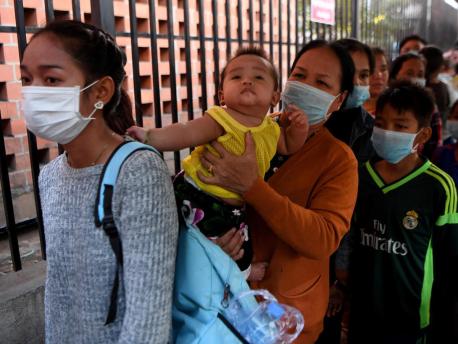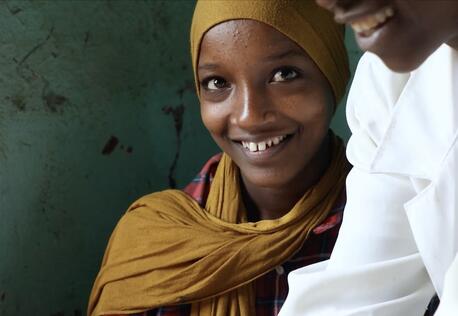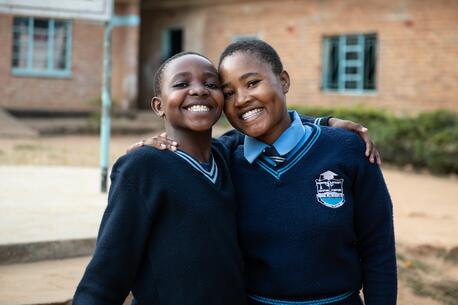
Seven Things You Should Know About the Coronavirus Outbreak
UNICEF is providing supplies and expertise to help control the spread of COVID-19. Stay safe by learning the facts.
UPDATED March 23, 2020
In the months since the novel coronavirus SARS-CoV-2 was first identified, the number of confirmed cases of COVID-19, the disease caused by the virus, has skyrocketed, and social distancing measures have upended the lives of children and families around the world.
On March 11, the World Health Organization officially declared COVID-19 a pandemic. As the global health community fights to contain transmission, a second, parallel epidemic of misinformation is alarming and confusing the general public. Below, some important facts everyone needs to know about the coronavirus:
1. What is the novel coronavirus?
Now called COVID-19, the mysterious acute respiratory illness that first appeared in December 2019 is caused by a new coronavirus, part of a large family of viruses that can cause a range of illnesses from Severe Acute Respiratory Syndrome (SARS) and Middle East Respiratory Syndrome (MERS) to the common cold.
2. How does coronavirus spread?
The coronavirus is transmitted through direct contact, coughing and sneezing, and touching surfaces contaminated by the virus. It is not yet known how long the virus survives on objects, but simple disinfectants can kill it. According to the Centers for Disease Control and Prevention (CDC), spread of coronaviruses from person to person happens most often when people are less than six feet apart.
.@UNICEF remains concerned about the spread of the novel #Coronavirus. The outbreak is a timely reminder of the simple steps you can take to protect yourself and your family from life-threatening viruses: https://t.co/EPW706Nt0J@WHOpic.twitter.com/nTuXgQZlKW
— Henrietta H. Fore (@unicefchief) February 3, 2020
3. How to protect yourself and your children from COVID-19:
- Stay home as much as possible.
- Wash hands often, for at least 20 seconds, using soap and water. If soap and water are unavailable, use an alcohol-based hand sanitizer.
- Cough or sneeze into the inside of your elbow or a tissue, and then throw the tissue away.
- Stay at least six feet away from anyone who has cold or flu-like symptoms.
- Contact your health care provider if you have a fever, cough or difficulty breathing.
4. What are the symptoms of the novel coronavirus?
Symptoms can include fever, dry cough and shortness of breath. In more severe cases, infection can cause pneumonia or breathing difficulties. Within China, the known case fatality rate (CFR, the proportion of cases who die) is approximately 2 percent, although epidemiologists caution this figure may be high, as many people with mild or no symptoms are never diagnosed. Symptoms can appear as quickly as two days after initial exposure, or up to two weeks later.
5. Can children get coronavirus?
Cases of coronavirus transmission in children have been remarkably low, according to a report published in JAMA. Children infected by the coronavirus typically have only mild symptoms or are asymptomatic. It's not unusual for children to be mildly affected by viruses that can cause severe illnesses in adults — chickenpox, for example.
In contrast, so far during the 2019-2020 season, 149 children have died from influenza in the United States. The best way to protect children from the flu, according to the American Academy of Pediatrics, is to make sure they receive their annual vaccination.
6. Do masks prevent coronavirus?
The CDC recommends that health care workers interacting with coronavirus patients or suspected cases wear strong masks, known as N95 respirators, which filter out 95 percent of airborne particles.
Global shortages fueled by rising demand, hoarding and misuse endanger the medical professionals we rely upon to care for the sick. Do not stockpile masks. The WHO, which has shipped nearly half a million sets of personal protective equipment to 27 countries, estimates that 89 million medical masks will be needed to fight COVID-19 each month.
When is it necessary to use a mask? #coronaviruspic.twitter.com/LrAnB9QoHB
— World Health Organization Western Pacific (@WHOWPRO) February 6, 2020
7. UNICEF is supporting the coronavirus response with supplies and expertise.
By the time the World Health Organization (WHO) declared the coronavirus outbreak a global health emergency on January 30, UNICEF had already rushed the first shipment of 6 metric tons of medical supplies to aid response efforts. UNICEF Supply Division is working closely with WHO and partners for a coordinated multi-sectoral response in affected countries.
Respiratory masks, protective suits and other badly needed supplies flown from UNICEF's warehouse in Copenhagen are protecting health workers on the front lines and helping to contain the virus. More supplies are set to be delivered where they are needed most in the coming days and weeks.
From UNICEF’s global supply hub in Copenhagen to Wuhan: 10,860 protective suits, 1,577 surgical masks, 18,371 respiratory masks en route to support the Chinese government response to the #coronavirus outbreak pic.twitter.com/KV0wTljGNC
— UNICEF Supply (@UNICEFSupply) January 29, 2020
"The coronavirus is spreading at a breakneck speed and it is important to put all the necessary resources into halting it," said UNICEF Executive Director Henrietta Fore. "We may not know enough about the virus's impact on children or how many may be affected — but we do know that close monitoring and prevention are key. Time is not on our side."
Your gift will support UNICEF's critical response to the coronavirus global health emergency.
Top photo: People wearing face masks line up to enter a children’s hospital in Phnom Penh, Cambodia on January 30, 2020 after the nation’s first case of novel coronavirus COVID-19 was reported. © UNICEF/UNI288092/Chhin Sothy/AFP-Services
HOW TO HELP
There are many ways to make a difference
War, famine, poverty, natural disasters — threats to the world's children keep coming. But UNICEF won't stop working to keep children healthy and safe.
UNICEF works in over 190 countries and territories — more places than any other children's organization. UNICEF has the world's largest humanitarian warehouse and, when disaster strikes, can get supplies almost anywhere within 72 hours. Constantly innovating, always advocating for a better world for children, UNICEF works to ensure that every child can grow up healthy, educated, protected and respected.
Would you like to help give all children the opportunity to reach their full potential? There are many ways to get involved.





